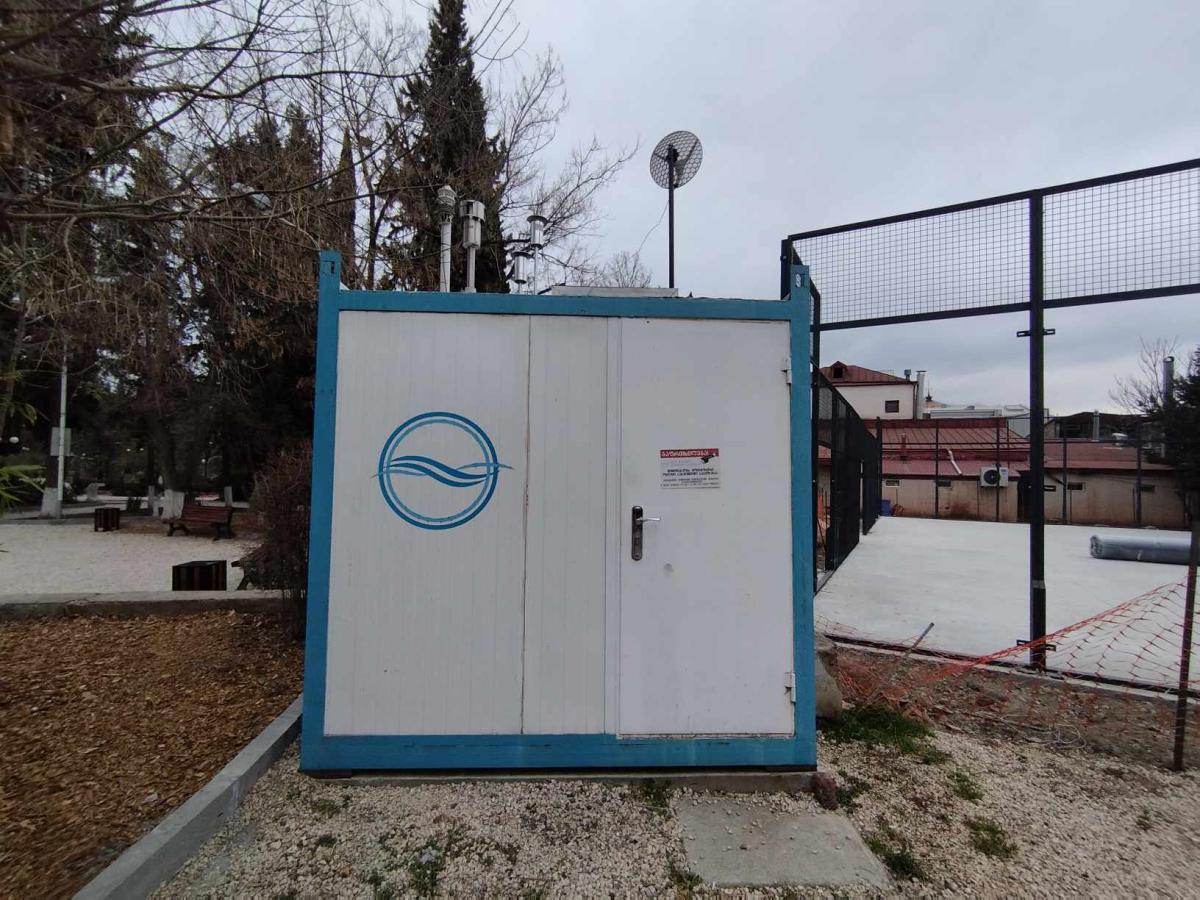According to a map on the air portal https://air.gov.ge/ there are seven stationary automatic air pollution monitoring stations in Georgia. Most are working with significant limitations, and some have been out of order for the last two years.
According to the National Environment Agency, NEA, two more stations were added to the atmospheric air monitoring network in the autumn of 2023, one in Tbilisi and one in Rustavi. Their location and air data is not yet marked on the Air Portal map.
On February 13 Cactus requested data on the two new stations from the National Agency of Environment, including the date they will go online. The agency confirmed acceptance of this letter. The answer is due in ten working days.
Some of the stations were donated to Georgia and others were purchased from the national budget. 4,719,822.49 lari [about $US1.8 million] has been spent on the stations.
How Do Automatic Air Monitoring Stations Work in Georgia?
Automatic stations do not need daily human service. Electricity, internet, periodic calibration, and similar technical work is needed.
Proper operation of the air analyzers is vital. This is the technology that interprets the information received from the air, through filters, and converts it into the data made public on the portal air.gov.ge.
Donors have almost always provided technical assistance, including the hiring of a non-Georgian technician, depending on the duration of the project. On at least one station, maintenance exceeded the cost of the station itself.
On December 1, 2023, two photos were published on the Facebook page of the National Environment Agency titled "Training of Analyzer Operators" with the following description: "Specialists of the Environmental Pollution Monitoring Department of the National Environment Agency, within the framework of the "Save Nature-Georgia" project, received training on the functioning of the analyzers located at the new air quality monitoring stations."
Photo © Georgian National Agency of Environment, NEA | 12/1/2023
Who Maintains Automatic Air Quality Stations?
The National Environment Agency is responsible for proper operation of automatic air quality stations. The Agency is under the auspices of the Ministry of Environmental Protection and Agriculture of Georgia.
For the last two years, Cactus has repeatedly asked the National Environment Agency who is responsible for proper operation of the automatic stations: are they agency staff or international specialists hired for the duration of a grant? Is their work terminated immediately at the end of a project, and is this why stations are no longer in operation?
Cactus has not received comprehensive answers to these questions.
There is an Environmental Pollution Monitoring Department in the National Environment Agency, among its tasks is to record environmental pollution in Georgia. The head of this department is Marine Arabidze. Cactus has also asked for an interview with Ms. Arabidze, which has not been confirmed yet.
On the air.gov-ge site, the reason for limited operation of all stations is called "technical fault" without describing the problems in detail. For the Tsereteli station, the "Internet provider" is named as a technical limitation, but it is not specified whether this is the only problem of the station or not.
The First Air Quality Automatic Station in Tbilisi
Vashlijvari air quality monitoring station was the first of its kind in Georgia. It is not working.
This station was opened on July 5, 2012. The donor for the purchase and operation was the Embassy of the Netherlands.
Photo © meteo.gov.ge | On the left, then-ambassador of the Netherlands to Georgia Peter Landenberg; in the middle, then-Minister of Environment and Natural Resources Protection Giorgi [Goga] Khachidze; on the right, Marine Arabidze, head of the Environmental Pollution Monitoring Department at the National Environment Agency, NEA | 06/05/2012
Cactus emailed questions about this station to the Embassy of the Netherlands on March 3, 2023 and received an official answer on July 26, 2023. According to a representative of the embassy, the answer took five months because details were being clarified with the National Environment Agency.
According to the embassy response, the name of the project for the Vashlijvari automatic station was "Air Quality Monitoring in Tbilisi.” According to the embassy, the total budget was 700,000 euros, of which the cost of the station itself was only 381,874 lari [about 133,660 euros].
According to the embassy representative, the National Environment Agency was responsible for monitoring the station, collecting the data, and making it public. No added money was donated for this work to the NEA.
Money beyond the cost of the station was spent on technical assistance provided by non-Georgian specialists. That includes training of employees of the National Environment Agency, plus parts and repairs for the station. Any warranty period for the station was not specified in the embassy's reply.
“The station which was developed in the framework of the project had significant importance as the first ever background automatic air quality station in Georgia. The experience of working with this station led to the development of many air quality monitoring stations in Georgia. During the first years, covered by warranty, maintenance and aftercare were provided by international specialists. Later, the station stopped working due to damaged equipment which proved impossible to repair. In the framework of the project, knowledge and expertise were provided by the government of the Netherlands to the project implementers. The project was finalized and handed over to the recipient in 2012. The Embassy considers the project closed from a programmatic point of view. The Embassy notes that the station is not operational at the moment but underlines the positive impact of the project, which served as a basis for creating a new system of air monitoring in Georgia,” - the Embassy letter to Cactus noted.
Kutaisi Air Quality Automatic Station
The Kutaisi station was installed on June 30, 2017. 461,354 lari [about $US175,000] was allocated from the government budget for its purchase.
While monitoring air.gov.ge, Cactus has observed that the Kutaisi station went offline on August 31, 2022 and resumed partial functions 14 months later on October 19, 2023.
For the last five days, the station has been showing all the pollutants, but for the last two years the Kutaisi station had been working with limitations. On some days, uncluding last year, it displayed data for only three, two or one pollutants, instead of the six for which it was designed.
Kutaisi automatic station data reflected on air.gov.ge in 2022 | Screenshot collage from © Cactus Archive
A week before its shutdown in the summer of 2022, the Kutaisi station showed high levels of particulate matter.
Source © air.gov.ge | Screenshot from Cactus Archive
Mobile Automatic Station
A mobile automatic air quality station was purchased by the National Environment Agency in April 2018 for 497,905 lari [about $US 189,000]. The station was brought to Poti on June 20, 2020, at the request of local residents to measure air quality.
For five months, the station was operational, and the following pollutants were measured: carbon monoxide [CO], sulfur dioxide [SO2], nitrogen oxides [NO2, NO, NOx], ozone [O3], particulate matter [PM10 and PM2.5], as well as meteorological parameters [wind speed, direction, barometric pressure, humidity].
Mobile automatic air monitoring station in Poti on Javakhishvili Street, August 2021 Photo © Cactus
Over 52 days, the level of solid particles [PM10 and PM2.5] exceeded levels permitted by Georgian legislation on several occasions.
The National Environment Agency told Cactus:
“The station has been operating [in Poti] since December 2020 under the so-called "warning/emergency” mode. The Agency could no longer consider the provided data as reliable: the risk of damage to the expensive air analyzers placed on the mobile station increased significantly.”
On January 22, 2021, in agreement with local residents and Poti City Hall, the National Environment Agency turned off the mobile automatic atmospheric air monitoring station in Poti and later moved it to Tbilisi.
Its current status is unknown. According to the last letter received from the National Environment Agency on this subject, it has been under repair.
Stations Donated by the Embassy of Japan
The Embassy of Japan is a generous donor of automatic air quality stations to Georgia.
In September 2016, the Embassy handed over three automatic stations to the National Environment Agency. Their total value was 2,478,730.49 lari [about $US942,000].
They often do not work properly. Some are periodically turned off, and others do not reflect all six pollutants they should. On December 23, 2023, from 12:00 to 18:00, the Tsereteli Avenue station did not work.
Data collage from Cactus archive: Tsereteli station is offline
Cactus sent questions to the Embassy of Japan on August 31, 2023 to find out whether the Embassy had information about the operational status of the stations and whether the Embassy has helped the agency to work better by offering any ongoing technical assistance.
Cactus has not received a response to this letter.
•
by Tsira Gvasalia.
Tsira Gvasalia is an investigative & science journalist based in Tbilisi, Georgia, with a strong background of working on long-term projects, including documentary films. She has worked for several Georgian print and online media organizations since 2010 and has also contributed to international media outlets. She has been focusing on investigating corruption connected to natural resource extraction and environmental pollution in Georgia, and Russian business interests in precious metals' mining in South Caucasus.


